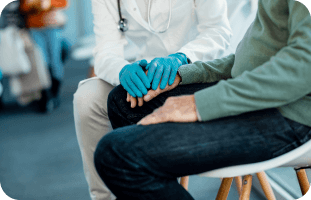Every MG patient is unique!
Myasthenia Gravis can be as unique as people themselves, with symptoms often varying from person to person.(2) Getting to a diagnosis may be a long and difficult journey. When doctors meet with people living with MG and discuss specific concerns or symptoms, they may consider a diagnosis of any of these types of MG:
 The 6 types of MG explained
The 6 types of MG explained 
Our immune systems typically create antibodies to fight diseases. However, in gMG, some antibodies attack the body instead of protecting it. This occurs when these autoantibodies target proteins in the neuromuscular junction, disrupting communication between nerves and muscles (3).
Approximately 85% to 90% of the time, people living with gMG have a serotype identified through antibody testing (4). Serotypes refer to variations of MG characterised by the proteins targeted by autoantibodies. The main serotypes include (1):
- Anti-acetylcholine receptor (AChR) antibody positive
- Anti-muscle-specific kinase (MuSK) antibody positive
- Anti-lipoprotein receptor-related protein 4 (LRP4) antibody positive
AChR, MuSK and LRP4 are involved when the brain signals the muscles to move. Autoantibodies disrupt this process, impacting muscle movement.(4) About 80% of people with generalised MG test positive for AChR antibodies.(2)
If a person has generalised MG, including seronegative MG (see below), they typically experience symptoms that impact many areas of their body. Their symptoms might include muscle weakness, trouble chewing and swallowing, and problems with speaking or smiling. They also might have difficulty doing everyday tasks, such as climbing stairs (5).
Other symptoms of generalised MG include (5):
- Drooping eyelids
- Blurred or double vision
- Crooked or down-turned mouth
- Twitching lips
When someone with MG has no identifiable autoantibodies, they may be considered to have seronegative myasthenia gravis (6).
Seronegative MG is a type of generalised myasthenia gravis. People with this condition experience the symptoms of gMG, including problems with breathing, moving, speaking and swallowing (5).
Some people living with MG experience symptoms exclusive to their eye muscles. This is called ocular Myasthenia Gravis, and it affects about 10% to 40% of MG patients.7 In some people, ocular MG progresses into generalised MG (8).
Common symptoms of ocular MG are diplopia (double vision) and ptosis (drooping eyelids).(8) Often, people living with ocular MG notice that their eye muscles feel weakest at the end of the day.
Why does MG only affect eye muscles for some people? Eye muscles are structured differently than muscles in the arms, stomach, legs and back. They tend to be more vulnerable to attacks from the immune system (9).
This type of MG can occur anytime from birth through early childhood (12). Unlike other types of MG, it’s not an autoimmune disorder. Instead, it stems from a genetic issue.
Symptoms of congenital MG resemble those of generalised MG(13). However, they might be milder if the condition appears later in life (13).
This rare condition usually begins before the age of 18 and lasts throughout life. Symptoms might start gradually and could be hard to notice, so the disease may go undiagnosed for a while. The most common symptoms of juvenile MG are drooping eyelids and double vision. In more generalised forms, patients may experience fatigue and problems with eating and swallowing (10).
Knowing the types of MG might help those living with MG, as well as caregivers, better understand the condition. It may also help loved ones provide more informed support. Healthcare providers may discuss MG types in more detail and provide information about managing symptoms.
This type of MG affects 10% to 20% of babies born to women with Myasthenia Gravis (10). During pregnancy, mothers might pass their autoantibodies to a developing fetus.(11) Symptoms, which usually appear in the first 24 hours of a baby’s life, may include (11):
- Problems with feeding and sucking
- Weak crying
- Lack of facial expressions
- Difficulty breathing
- Limbs that appear floppy and the child is too weak to bend their elbows and knees
Usually, as the mother’s antibodies disappear from the baby’s bloodstream, the baby recovers. It may take a few weeks or months (10).
Explore more useful content

Initiate the conversation with your doctor
Living with myasthenia gravis shouldn't stop you from doing the things you love. By talking to your healthcare professional, you can find a management plan that is tailored to your personal goals.
REFERENCES :
1. Kuks JBM. Clinical presentations of myasthenia gravis. In: Kaminski H, Kusner L, eds. Myasthenia Gravis and Related Disorders, Third Ed. Current Clinical Neurology. Humana Press; 2018:85-100.
2. Gilhus N. Lancet Neurol. 2015;14:1023-1036.
3. Hehir M, et al. Neurol Clin. 2018;36:253-260.
4. Gilhus N. N. Engl J Med. 2016;375;26:2570-2581.
5. Gilhus N, et al. Nat Rev Dis Primers. 2019;5:30.
6. Farrugia M, et al. Front Neurol. 2020;11:604.
7. Myasthenia Gravis Foundation of America. Overview of Myasthenia Gravis. 2020. https://myasthenia.org/understanding-mg/overview-mg/. Accessed Sept 2024.
8. Deymeer F. Acta Myol. 2020;39:345-352.
9. Nair, et al. Indian J Ophthalmol. 2014;62:985-991.
10. O’Connell K, et al. Front Neurol. 2020;11:743.
11. Gilhus N. Front Neurol. 2020;554(11):1-6.
12. Engel A, et al. Lancet Neurol. 2015;14(4):420-434.
13. Finsterer J. Orphanet J Rare Dis. 2019;14:57.



